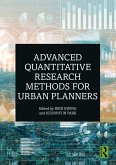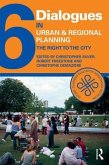Harry Smith, Paul Jenkins
Order and Disorder in Urban Space and Form
Ideas, Discourse, Praxis and Worldwide Transfer
Harry Smith, Paul Jenkins
Order and Disorder in Urban Space and Form
Ideas, Discourse, Praxis and Worldwide Transfer
- Gebundenes Buch
- Merkliste
- Auf die Merkliste
- Bewerten Bewerten
- Teilen
- Produkt teilen
- Produkterinnerung
- Produkterinnerung
This provocative and timely book explores how what we think of as urban order is partial and restricted, and what we perceive as disorder usually masks underlying orders of social nature. The book is intended for architects, urban designers, planners and urban scholars but also urban policy makers, managers and residents.
Andere Kunden interessierten sich auch für
![Regenerating Essential Goods and Services in Urban Landscapes Regenerating Essential Goods and Services in Urban Landscapes]() Douglas KentRegenerating Essential Goods and Services in Urban Landscapes161,99 €
Douglas KentRegenerating Essential Goods and Services in Urban Landscapes161,99 €![The Sustainable Urban Design Handbook The Sustainable Urban Design Handbook]() Kaarin KnudsonThe Sustainable Urban Design Handbook161,99 €
Kaarin KnudsonThe Sustainable Urban Design Handbook161,99 €![The Architecture of the Bight of Biafra The Architecture of the Bight of Biafra]() Joseph GodlewskiThe Architecture of the Bight of Biafra161,99 €
Joseph GodlewskiThe Architecture of the Bight of Biafra161,99 €![Advanced Quantitative Research Methods for Urban Planners Advanced Quantitative Research Methods for Urban Planners]() Advanced Quantitative Research Methods for Urban Planners165,99 €
Advanced Quantitative Research Methods for Urban Planners165,99 €![Exploring Networked Urban Mobilities Exploring Networked Urban Mobilities]() Exploring Networked Urban Mobilities197,99 €
Exploring Networked Urban Mobilities197,99 €![The Romanesque Architecture of the Order of Cluny The Romanesque Architecture of the Order of Cluny]() Joan EvansThe Romanesque Architecture of the Order of Cluny40,99 €
Joan EvansThe Romanesque Architecture of the Order of Cluny40,99 €![Dialogues in Urban and Regional Planning 6 Dialogues in Urban and Regional Planning 6]() Dialogues in Urban and Regional Planning 6197,99 €
Dialogues in Urban and Regional Planning 6197,99 €-
-
This provocative and timely book explores how what we think of as urban order is partial and restricted, and what we perceive as disorder usually masks underlying orders of social nature. The book is intended for architects, urban designers, planners and urban scholars but also urban policy makers, managers and residents.
Hinweis: Dieser Artikel kann nur an eine deutsche Lieferadresse ausgeliefert werden.
Hinweis: Dieser Artikel kann nur an eine deutsche Lieferadresse ausgeliefert werden.
Produktdetails
- Produktdetails
- Verlag: Taylor & Francis Ltd
- Seitenzahl: 246
- Erscheinungstermin: 20. September 2023
- Englisch
- Abmessung: 234mm x 156mm
- Gewicht: 700g
- ISBN-13: 9780415586924
- ISBN-10: 0415586925
- Artikelnr.: 59984405
- Herstellerkennzeichnung
- Libri GmbH
- Europaallee 1
- 36244 Bad Hersfeld
- gpsr@libri.de
- Verlag: Taylor & Francis Ltd
- Seitenzahl: 246
- Erscheinungstermin: 20. September 2023
- Englisch
- Abmessung: 234mm x 156mm
- Gewicht: 700g
- ISBN-13: 9780415586924
- ISBN-10: 0415586925
- Artikelnr.: 59984405
- Herstellerkennzeichnung
- Libri GmbH
- Europaallee 1
- 36244 Bad Hersfeld
- gpsr@libri.de
Paul Jenkins is Emeritus Professor of Architecture Research at the University of Edinburgh, Scotland, and Visiting Professor at the University of the Witwatersrand, Johannesburg, South Africa. He has also been a visiting professor in São Paulo, Brazil, and Maputo, Mozambique. For five decades he has engaged with a wide range of aspects of the built environment: architecture, construction, housing, planning, urban design and wider social studies. Much of his work has focused on sub-Saharan Africa, where he has been based for more than half of his working life, and he focuses on social engagement and cultural change in the 'urban', including the role of different forms of knowledge. He has published extensively, including three prior books with Routledge. Now retired, he lives primarily in Maputo, Mozambique. Harry Smith is Professor of Global Urbanism at The Urban Institute, Heriot-Watt University, Edinburgh, Scotland. He has over 30 years of experience working with urban design and development issues, having worked as an architect and planner in the Global North and then having become an academic engaged in urban research in Europe, Latin America and sub-Saharan Africa. Much of his research has focused on issues in so-called 'informal' settlements - ranging from housing, through access to land, to community-based disaster risk management - and has often taken an action-research approach linked to achieving changes in policy and practice. He has published previously with Routledge on planning and housing in the rapidly urbanising world, waterfront regeneration, and place-keeping.
1. The beginnings of ordering urban space and form in the modern era 2.
Aspiring to polite society: the transfer of Enlightenment urban design to
Rio de Janeiro 3. Garden city planning is translated into São Paulo 4. The
Functional city and Brasília 5. Functionalism translated into Brazil and
then re-exported: Curitiba 6. Parallel innovations in urban space and form:
Alphaville in Brazil and New Urbanism in the United States 7. Innovations
in engaging with urban disorder in Brazil: slum upgrading 8. A change of
focus from physical to social urban order in Brazil: the right to the city
and participatory planning 9. New forms of urbanism re-exported: gated
communities, waterfronts and consumerism-oriented order in Angola 10.
Understanding order and disorder in urban space and form: discourse and
praxis
Aspiring to polite society: the transfer of Enlightenment urban design to
Rio de Janeiro 3. Garden city planning is translated into São Paulo 4. The
Functional city and Brasília 5. Functionalism translated into Brazil and
then re-exported: Curitiba 6. Parallel innovations in urban space and form:
Alphaville in Brazil and New Urbanism in the United States 7. Innovations
in engaging with urban disorder in Brazil: slum upgrading 8. A change of
focus from physical to social urban order in Brazil: the right to the city
and participatory planning 9. New forms of urbanism re-exported: gated
communities, waterfronts and consumerism-oriented order in Angola 10.
Understanding order and disorder in urban space and form: discourse and
praxis
1. The beginnings of ordering urban space and form in the modern era 2.
Aspiring to polite society: the transfer of Enlightenment urban design to
Rio de Janeiro 3. Garden city planning is translated into São Paulo 4. The
Functional city and Brasília 5. Functionalism translated into Brazil and
then re-exported: Curitiba 6. Parallel innovations in urban space and form:
Alphaville in Brazil and New Urbanism in the United States 7. Innovations
in engaging with urban disorder in Brazil: slum upgrading 8. A change of
focus from physical to social urban order in Brazil: the right to the city
and participatory planning 9. New forms of urbanism re-exported: gated
communities, waterfronts and consumerism-oriented order in Angola 10.
Understanding order and disorder in urban space and form: discourse and
praxis
Aspiring to polite society: the transfer of Enlightenment urban design to
Rio de Janeiro 3. Garden city planning is translated into São Paulo 4. The
Functional city and Brasília 5. Functionalism translated into Brazil and
then re-exported: Curitiba 6. Parallel innovations in urban space and form:
Alphaville in Brazil and New Urbanism in the United States 7. Innovations
in engaging with urban disorder in Brazil: slum upgrading 8. A change of
focus from physical to social urban order in Brazil: the right to the city
and participatory planning 9. New forms of urbanism re-exported: gated
communities, waterfronts and consumerism-oriented order in Angola 10.
Understanding order and disorder in urban space and form: discourse and
praxis








